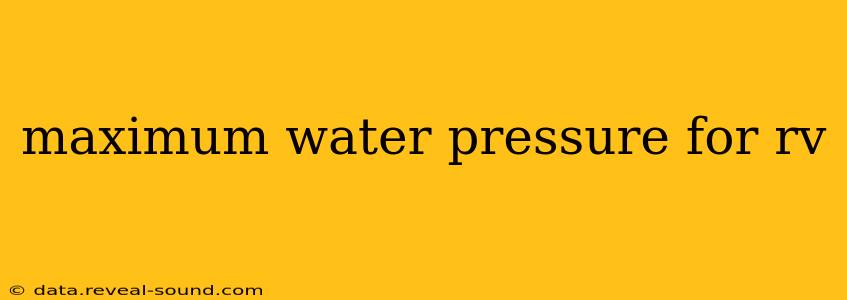Recreational vehicles (RVs) rely on a delicate balance of water pressure to function correctly. Too much pressure, and you risk damaging your pipes, fittings, and appliances. Too little, and you'll struggle with weak water flow. Understanding the maximum water pressure your RV can handle is crucial for preventing costly repairs and ensuring a smooth, enjoyable camping experience.
What is the maximum recommended water pressure for an RV?
The generally accepted maximum water pressure for most RVs is 50 PSI (pounds per square inch). However, it's crucial to consult your RV's owner's manual. This document will specify the manufacturer's recommended pressure range for your specific model. Some RVs might tolerate slightly higher pressures, while others may have lower thresholds. Always prioritize the manufacturer's guidelines.
What happens if the water pressure exceeds the RV's limit?
Exceeding the maximum water pressure can lead to several serious problems:
- Burst Pipes: The most significant risk is the rupturing of pipes, especially older or more brittle ones. This can cause significant water damage within your RV, requiring extensive repairs.
- Damaged Fittings and Connections: High pressure can loosen or break fittings and connections, leading to leaks and potentially further damage to your plumbing system.
- Malfunctioning Appliances: Your water heater, toilet, and shower are all susceptible to damage from excessive water pressure. A burst water heater, for example, can be extremely dangerous.
- Increased Risk of Leaks: Even without immediate catastrophic failure, sustained high pressure can weaken seals and gaskets, increasing the likelihood of future leaks.
How can I regulate the water pressure in my RV?
There are several ways to ensure your RV's water pressure remains within the safe limits:
- Water Pressure Regulator: This is the most effective solution. A water pressure regulator is an inexpensive device installed on your water hookup that reduces the incoming water pressure to a safe level, typically around 40-50 PSI. It's a simple installation that provides crucial protection.
- Check Campground Water Pressure: Before connecting to a water source, check the campground's water pressure. Many campgrounds provide this information, or you can use a simple pressure gauge. If the pressure is too high, you may need to find a different hookup or use a pressure regulator.
- Regular Inspections: Regularly inspect your RV's plumbing system for leaks, loose fittings, or signs of damage. Early detection can prevent more significant problems.
What about using a water filter?
While a water filter improves the quality of your water, it doesn't directly regulate pressure. It's perfectly acceptable to use a water filter in conjunction with a pressure regulator, but the filter alone won't protect your RV from high water pressure.
Can I use a booster pump to increase water pressure?
Boosting the water pressure in your RV is generally not recommended unless you have a system specifically designed for that purpose and understand the implications. Improperly boosting pressure can easily exceed your RV's safe limits.
How often should I check my RV's water pressure?
It's a good practice to check your RV's water pressure whenever you connect to a new water source. Regularly inspect your plumbing system as well, looking for any signs of leaks or damage.
By understanding the maximum water pressure for your RV and taking proactive steps to regulate it, you can safeguard your investment and enjoy worry-free camping adventures. Remember, consulting your owner's manual is the first and most important step in ensuring the longevity and safety of your RV's water system.
